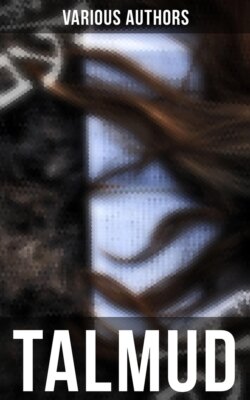Читать книгу TALMUD - Various Authors - Страница 93
На сайте Литреса книга снята с продажи.
CHAPTER IV.
ОглавлениеMISHNA a. What was done with the money drawn? Concerning the watchmen that were sent out to guard the after-growth of the Sabbatical year, of which the Omer and two loaves were taken for sacrifice. The opinion of R. Jose in this matter, and what the rabbis answered.
MISHNA b. Concerning the red heifer, the goat that was to be sent away, the strip of scarlet, the bridge for the cow, the bridge for the goat, the canal, the city wall, the towers, and other necessities of the city: all were paid for out of the Shekalim money. What Abba Saul said.
MISHNA c. What was done with the balance of the money left over in the treasury. The discussion of R. Ishmael and R. Aqiba in this matter. Some of the many things which are enumerated in the Palestinian Talmud and which were done with this money. Among them was the hiring of teachers for priests to teach them the laws of the sacrifices.
MISHNA d. What was done with the remainder of the moneys of the chest. The different opinions of R. Ishmael, R. Aqiba, and R. Hanina, the assistant chief of the priests, concerning profit: if it might be raised from the remaining money or not, and of what money the gold plates for the decorations of the Holy of Holies were made. Also, concerning the benefit of the altar.
MISHNA e. What was done with the remainder of the incense (as the incense of the New Year must be bought with the new Shekalim money). The sanctification of the incense on hand then transferred to that money, and then redeemed with the money of the new revenue.
MISHNA f. Concerning the law when one devoted his entire possessions in honor of the Lord: what should be done with them. The discussions of R. Aqiba and Ben Asai regarding this matter.
MISHNA g. Concerning the law when one devoted his possessions, and among them were cattle, male and female, fit for the altar. The discussions of this matter between R. Eliezer and R. Jehoshua. R. Aqiba is inclined to the opinion of R. Eliezer, which seems to him to be more proper, but adds that he had heard that both opinions were right according to circumstances.
MISHNA h. If one devote his possessions, and among them are things fit for the altar, such as wines, oils, and birds, what should be done with them. R. Eliezer decreed it, and no one opposed him.
MISHNA i. Contractors, for the delivery of all things for the altar and the improvements of the Temple, were appointed every month; but if the prices changed during the thirty days, the Sanctuary must not suffer any injury. Such was the agreement made between them. The illustration of this.
